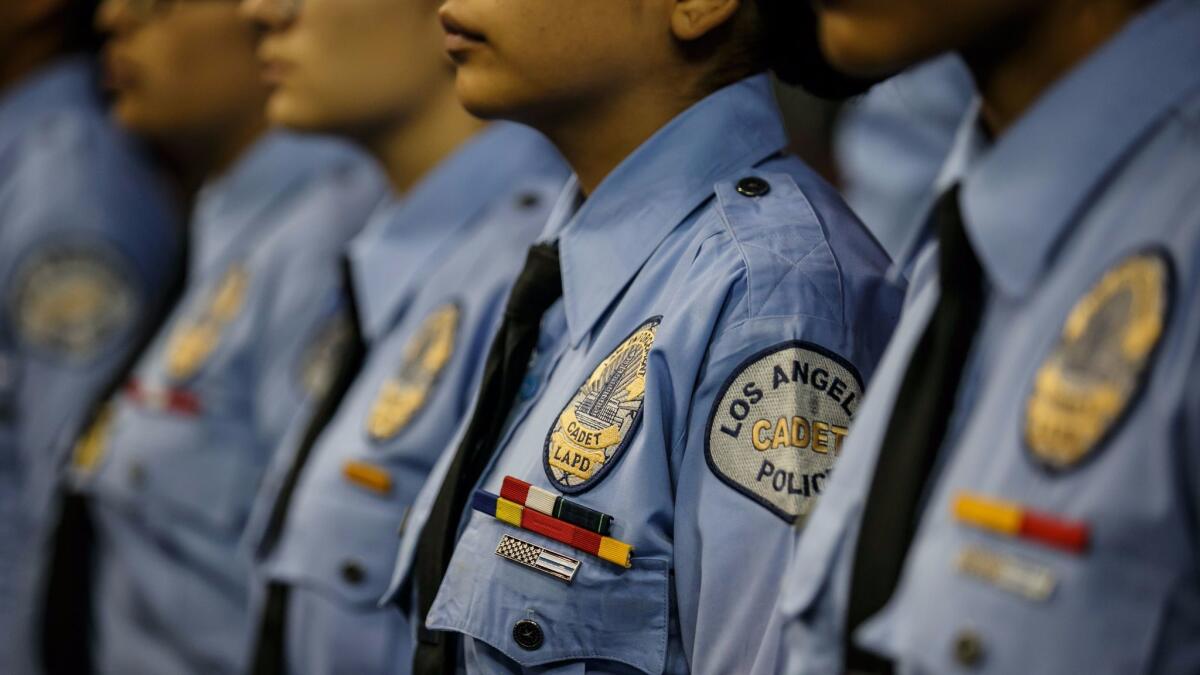New report raises fresh concerns about LAPD’s cadet program, equipment rooms

- Share via
A new review of practices inside the Los Angeles Police Department’s equipment rooms paints a troubling picture: Doors were occasionally propped open. If they were locked, some officers left their gear in crates outside. Sometimes, if the officer in charge of the room was gone and couldn’t check equipment out, officers left Post-it notes listing what they had taken.
The report released Friday by the department’s inspector general formalized long-running complaints with how many LAPD stations oversee valuable gear, concerns rekindled this summer after teenagers in its signature cadet program were able to swipe police cars, Tasers and other equipment.
The explosive episode led to the arrests of seven cadets along with an officer who was later charged with having unlawful sex with one of them, a 15-year-old girl.
The officer, Robert Cain, 31, was also charged with 10 felony weapons charges in San Bernardino County following a search of his home. He has pleaded not guilty to those charges. All seven teens arrested in the thefts, including the girl, were dropped from the cadet program.
The LAPD released its own report — and subsequent changes to the cadet program — last month, but the inspector general’s was the first public review that evaluated the equipment check-out process.
The report, issued by acting Inspector General Django Sibley, described “problematic issues” with that process. The computer system used to check equipment in and out is widely accessible and the information can be modified, the report said. Officers assigned to the equipment rooms — also called “kit rooms” — are often away doing other tasks. And only two of the LAPD stations reviewed by the inspector general’s staff conducted monthly checks to make sure no department vehicles were missing from their parking lots.
As a result, the inspector general’s office recommended a series of changes, including limiting who can log onto the computer system, mandating routine checks of patrol cars and potentially having civilians work the kit rooms full time.
LAPD brass told investigators that “virtually all of these recommendations are already being undertaken, or are under consideration,” the report said.
In a statement, LAPD spokesman Josh Rubenstein said the department had put together a working group — which includes the inspector general’s office — tasked with identifying ways to improve the check-out systems and procedures.
Rubenstein noted that the LAPD made changes to the cadet program following its own review, saying many of the recommendations in the new report “have already been addressed or are in the process of being addressed to ensure the integrity of the program, safety of our youth participants and trust of our community.”
As it examined the cadet program, the inspector general highlighted some of the issues previously raised by the LAPD, saying there should be stricter criteria for selecting the officers who work with cadets, as well as formalized training.
But a few of the 12 recommendations pressed the LAPD to go further in the changes that were recently rolled out.
Although the LAPD has said that only officers assigned to the cadet program could communicate with cadets via text message or social media, the inspector general’s office recommended the department “re-evaluate whether one-to-one communication is acceptable.”
The report also called for a closer look at how donations are made to the cadet program, raising concerns over how money from boosters is monitored. It also noted a vast disparity in donations received by cadet posts at each division — this summer, the booster-less post at the Devonshire station had $26.20 in an account, whereas the booster-rich Topanga post had a combined $12,000 in two accounts.
”The types of activities Devonshire cadets could experience would likely differ from the types available to Topanga cadets,” the report noted.
The LAPD, the report said, should “consider impacts of financial disparity and methods to promote uniformity in cadet experience across all area posts.”
The Police Commission will review the report and its recommendations at its meeting next week.
More to Read
Sign up for Essential California
The most important California stories and recommendations in your inbox every morning.
You may occasionally receive promotional content from the Los Angeles Times.














